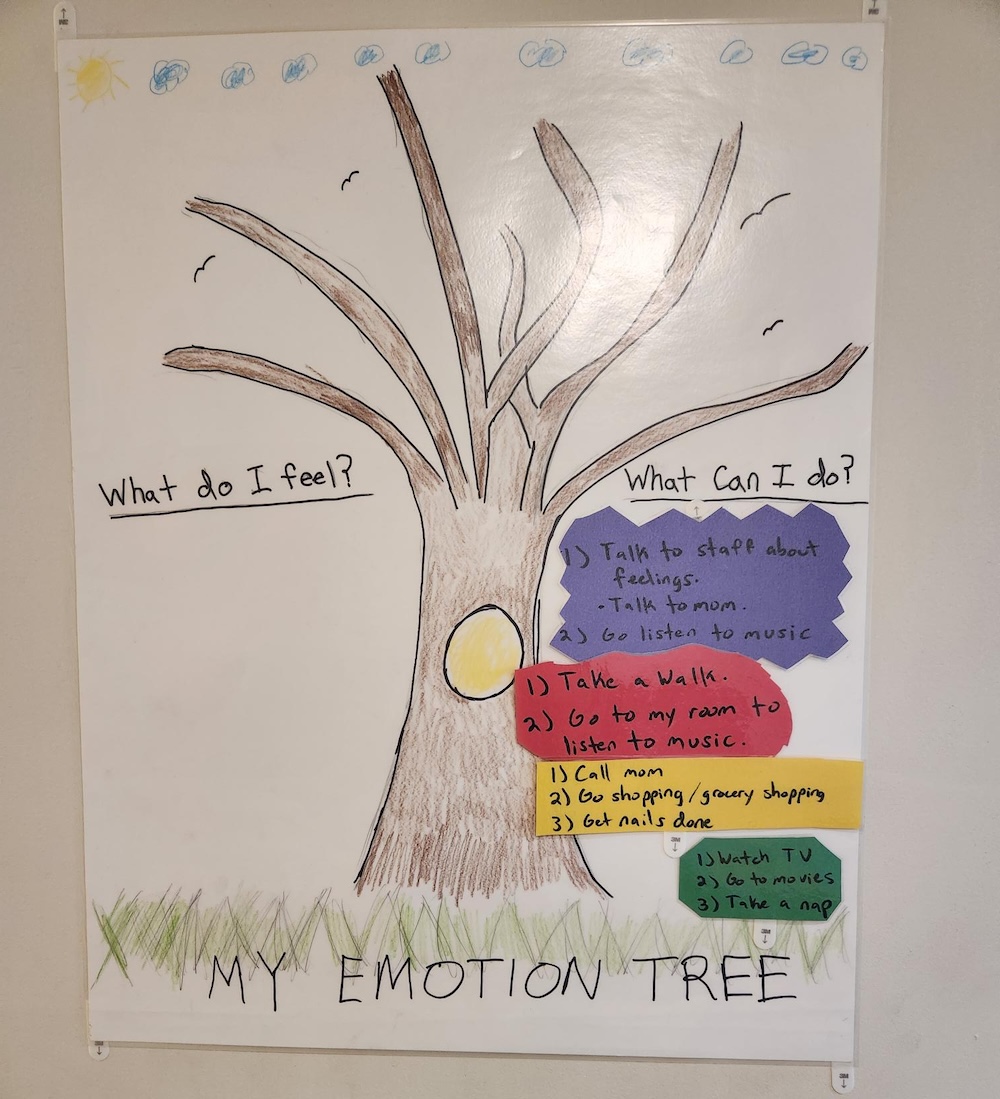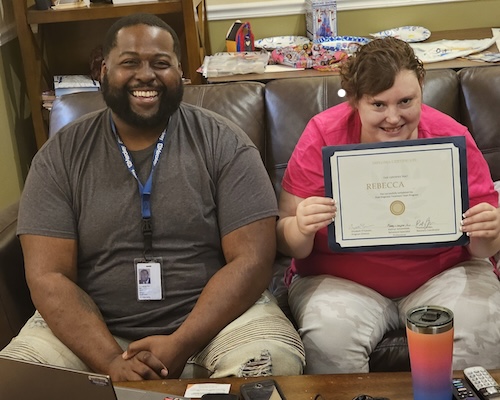Celebrating Rebecca's Success Amid DSP Turnover
Upon the loss of a DSP who had supported her for 10 years, Rebecca – a person supported by InVision – found herself facing a period of hardship. Changes among the people we have grown close with is no easy feat for anyone, as these changes can leave room for overwhelming negative feelings. People who experience disabilities are no different than those without such a diagnosis in their grief of losing someone who has been a constant presence in their lives – whether it be friends, family, or direct support staff.
Direct Support Professionals (DSPs) play a pivotal role in the lives of people who experience disabilities, as they spend much of their time learning about the people they support, building connections and relationships, and providing companionship. As such, changes in direct support staff can be difficult and have a lasting impact on a person who has grown to feel safe, comfortable, and understood by their support staff.
While it is true that there are various factors that play a role in why a person chooses to leave their jobs, the current state of the human services industry plays an integral part in high turnover rates and vacancies among the direct support workforce. According to the American Network of Community Options and Resources (ANCOR), the median hourly wage for DSPs is around $14.50 – resulting in turnover rates around 44% and vacancy rates of more than 20%. Inadequate reimbursement rates from the state government cause understaffing, and both are issues that organizations across the state are working to combat – starting with the advocacy for increased salaries for DSPs.
 The DDTT program acted as a direct crisis line for Rebecca to call whenever she needed, offered Rebecca emotional guidance and coping skills, and planned activities with Rebecca once a week. Rebecca’s team of support staff and DDTT also came together once a month to discuss the positives and focus Rebecca’s treatment by identifying areas for improvement.
The DDTT program acted as a direct crisis line for Rebecca to call whenever she needed, offered Rebecca emotional guidance and coping skills, and planned activities with Rebecca once a week. Rebecca’s team of support staff and DDTT also came together once a month to discuss the positives and focus Rebecca’s treatment by identifying areas for improvement.
A little over a year later, Rebecca and her team are celebrating her success as she recently “graduated” from the program! Over her time with DDTT, Rebecca and her team of DSPs worked to overcome various difficult feelings and behaviors. We are proud to share that Rebecca has had much success in persevering and has shown great resilience in her pursuit of new health goals and building a meaningful life.
Rebecca’s accomplishments from her hard work and dedication over the past year include earning reduced supervision, lifted restrictions, maintaining a positive outlook, and completing a job assessment to begin applying for job – as Rebecca has displayed commitment to earning money and saving for bigger purchases.
 “I am very proud of her,” Julia shared. “I have told her more than once that I am so proud of all she has done. She has made huge strides!”
“I am very proud of her,” Julia shared. “I have told her more than once that I am so proud of all she has done. She has made huge strides!”
In celebration of these successes, Rebecca’s team from InVision and DDTT baked cupcakes and enjoyed a dinner together. Julia even brought Rebecca roses – noting that Rebecca is very happy about her achievements.
“Rebecca has been vocal about her happiness,” Julia added. “She is laughing and smiling more and has been very receptive and expressive.”
InVision is so proud of you, Rebecca! Keep up the great work – we can’t wait to hear about all the amazing things you will continue to accomplish in the future.
Direct Support Professionals (DSPs) play a pivotal role in the lives of people who experience disabilities, as they spend much of their time learning about the people they support, building connections and relationships, and providing companionship. As such, changes in direct support staff can be difficult and have a lasting impact on a person who has grown to feel safe, comfortable, and understood by their support staff.
While it is true that there are various factors that play a role in why a person chooses to leave their jobs, the current state of the human services industry plays an integral part in high turnover rates and vacancies among the direct support workforce. According to the American Network of Community Options and Resources (ANCOR), the median hourly wage for DSPs is around $14.50 – resulting in turnover rates around 44% and vacancy rates of more than 20%. Inadequate reimbursement rates from the state government cause understaffing, and both are issues that organizations across the state are working to combat – starting with the advocacy for increased salaries for DSPs.
Rebecca’s Story
Julia Boyer, a Behavioral Specialist at InVision who has worked with Rebecca for the past five years, played an important role in ensuring Rebecca had the support and resources necessary to help her through this adversity. Alongside Rebecca’s current team of support staff, Julia enlisted additional aid through a Dual Diagnosis Treatment Team (DDTT). The DDTT program acted as a direct crisis line for Rebecca to call whenever she needed, offered Rebecca emotional guidance and coping skills, and planned activities with Rebecca once a week. Rebecca’s team of support staff and DDTT also came together once a month to discuss the positives and focus Rebecca’s treatment by identifying areas for improvement.
The DDTT program acted as a direct crisis line for Rebecca to call whenever she needed, offered Rebecca emotional guidance and coping skills, and planned activities with Rebecca once a week. Rebecca’s team of support staff and DDTT also came together once a month to discuss the positives and focus Rebecca’s treatment by identifying areas for improvement.A little over a year later, Rebecca and her team are celebrating her success as she recently “graduated” from the program! Over her time with DDTT, Rebecca and her team of DSPs worked to overcome various difficult feelings and behaviors. We are proud to share that Rebecca has had much success in persevering and has shown great resilience in her pursuit of new health goals and building a meaningful life.
Rebecca’s accomplishments from her hard work and dedication over the past year include earning reduced supervision, lifted restrictions, maintaining a positive outlook, and completing a job assessment to begin applying for job – as Rebecca has displayed commitment to earning money and saving for bigger purchases.
 “I am very proud of her,” Julia shared. “I have told her more than once that I am so proud of all she has done. She has made huge strides!”
“I am very proud of her,” Julia shared. “I have told her more than once that I am so proud of all she has done. She has made huge strides!”In celebration of these successes, Rebecca’s team from InVision and DDTT baked cupcakes and enjoyed a dinner together. Julia even brought Rebecca roses – noting that Rebecca is very happy about her achievements.
“Rebecca has been vocal about her happiness,” Julia added. “She is laughing and smiling more and has been very receptive and expressive.”
InVision is so proud of you, Rebecca! Keep up the great work – we can’t wait to hear about all the amazing things you will continue to accomplish in the future.


